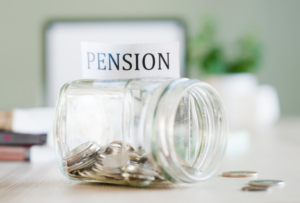 There are a lot of options when it comes to saving for your retirement. Regularly paying into a private pension over the course of your working life is the most common choice for savers in the UK, but it is not the only one. With a pension you can benefit from tax relief, employer contributions and compound interest which over time can help build a significant pot for your retirement. However, a significant number of people will opt for alternative ways to fund their retirement. This could be because they don't want to lock money away in a pension, they think they can get better returns elsewhere or they don't fully understand the benefits of a pension. In this article we will pit pensions against some common alternatives to help you decide which option is right for you.
There are a lot of options when it comes to saving for your retirement. Regularly paying into a private pension over the course of your working life is the most common choice for savers in the UK, but it is not the only one. With a pension you can benefit from tax relief, employer contributions and compound interest which over time can help build a significant pot for your retirement. However, a significant number of people will opt for alternative ways to fund their retirement. This could be because they don't want to lock money away in a pension, they think they can get better returns elsewhere or they don't fully understand the benefits of a pension. In this article we will pit pensions against some common alternatives to help you decide which option is right for you.
Pension vs Savings
The main benefits of paying into a pension relate to the advantages of tax relief. Therefore, the best savings option to compare a pension to would be an ISA, an account that also comes with tax-related benefits. As of the 2024/25 tax year, you can save up to £20,000 per year into your ISA accounts. You do not pay tax on the money you save and you do not pay tax when you withdraw it, however you will not get the tax relief you would get with a pension.
When you pay money you have earned into a pension, the income tax you have already paid is essentially returned via a government top-up. However, you will be liable for income tax when you withdraw your pension in your retirement. The exception is that 25% of your pension pot can be withdrawn as a tax-free lump sum. Outside of tax benefits, the significant difference between a savings account and a pension is access. Savings accounts come with a variety of different access levels. Some will lock away your money for years, while others can be accessed easily. Lifetime ISAs can only be accessed when you buy your first home or reach 60. In contrast, you can only spend your pension when you reach the pension age, which is currently 55. Easy-access does have an obvious downside in that your money is not protected from your own financial situation. You may be tempted to spend your savings on a big purchase or need to access your money because of an emergency. You can read more in our article ‘Pension vs ISA – which is the better investment?’.
If you die before you are able to spend all of your retirement savings, the funds will be counted as part of your estate and passed on in your will. However, if you have purchased an annuity through your pension to fund your retirement, you will likely not be able to pass on the income to a beneficiary. We have more information on annuities in our article ‘What is an annuity pension?‘.
Your savings will be taken into account as part of many means-tested benefits calculations, while contributions made to a personal or workplace pension are disregarded when calculating income for Universal Credit.
Pension vs Lifetime ISA
You may have read about how a Lifetime ISA (or LISA) can help build up your retirement savings. The money you save up in a LISA can be used towards a deposit to buy your first home, to fund your retirement or both. You can only open a LISA if you are between 18 and 40. The money you save into your LISA will be topped up by a 25% bonus from the government, with the total bonus capped at £1,000 per year. You will be able to save into your Lifetime ISA until you are 50. At that point you cannot make any more deposits, though your money will continue to earn interest and grow. You can access your savings for free once you reach 60, or when you take out a mortgage to buy your first home. Your funds can be withdrawn in small chunks gradually, or as one lump sum.
The money can be withdrawn before you reach 60 or for another reason other than for your first mortgage deposit, but you will need to pay a 25% penalty. This wipes out the government bonus along with some additional cash you would have saved. The 25% bonus can make a LISA appealing to people looking to retire, but it is not necessarily a better option than a standard pension. Pension contributions are topped up based on the pre-tax amount. This means that a £100 contribution will be topped up by £25, the same as it would be in a LISA. The top-up is even higher if you are not a basic-rate taxpayer. With a pension, you can contribute up to 100% of your earnings each year or up to the annual allowance of £60,000, far more than you can pay into a LISA. You can also pay into a pension past 50 and access it earlier than a LISA, unless you are buying your first home.
One thing to note is that you do not need to pay tax when you withdraw from your LISA, while only 25% of a pension can be withdrawn tax free. This means it could be a good option if you need to access a significant lump sum when you retire.
Pensions vs Investments
You do not have to choose between saving into a pension and investing your money in Stocks and Shares, as you can do both. A SIPP (self-invested personal pension) is a type of personal pension that you can use to invest your money to build and grow a retirement fund. It shares many of the key attributes of a standard personal pension, however, a SIPP comes with a greater degree of flexibility. You can pick and choose where you want to invest your savings, rather than a pension provider making the calls on where your money goes. You can learn about the difference between a SIPP and other types of pension in our article ‘Choosing a SIPP vs a personal pension’.
A SIPP makes saving into a pension much more similar to investing your money in any other way, but with the added tax relief bonus. You can also invest far beyond your annual ISA limit of £20,000 and still not need to pay tax on your interest. However, the money you withdraw from your SIPP in retirement will count as income for tax purposes. You could choose to invest without needing to make many big decisions through a ready-made pension. Read our article ‘Best ready-made pension’ to see what might suit you. Where a SIPP loses out to other investment accounts is access. You cannot access the money in your SIPP until you reach pension age.
Pension vs Investing in property
Some people may prefer to invest in property over contributing to a pension. While investing in property has the potential to be lucrative, it comes with significant drawbacks. Property prices have the potential to rise and fall, so there is the danger that you may hit a dip at the moment you are looking to retire. This can apply if you have purchased a property as an investment or if you are planning to downsize to a cheaper property. You may see buy-to-let properties as an alternative to a pension, with the potential to live off rental income in retirement. The flaw in this plan is that if you are a landlord, you are still working. You will have certain legal responsibilities to ensure the property is maintained and tenancies are correctly managed. There will be decisions to make and responsibilities to hold.
If you are considering paying off a buy-to-let mortgage through rental income, you should think about the tax implications when selling the property in retirement. You will need to pay capital gains tax upon selling a property you have not lived in, while landlords are no longer able to offset rental income against mortgage repayments. Investing in property can have high operating costs, whether or not you choose to become a landlord. The cost of maintaining a property, finding new tenants or repairing damage can quickly add up. It may not be the reliable source of income you need once you have finished working. Putting all of your investment eggs into one basket is also a risky strategy, as diversification can help you ride out any volatility in the housing market. An alternative could be investing in commercial property through a SIPP, as you are able to take advantage of investment gains and tax relief.
Private Pension vs the State Pension
A pension you pay into yourself or through your employment will be a private pension, this is different to the State Pension. The State Pension is a benefit provided by the government. It is a regular income that most people will be able to claim it once they reach the State Pension age, until they die. The amount you get from your State Pension payments will depend on the number of years of National Insurance Contributions (NICs) you have. You can read more about the value of the State Pension in our article 'How much is the UK State Pension?'. We also cover eligibility on our 'Will I get a state pension?' page.
Unfortunately, State Pension payments are unlikely to be enough to meet all of your expenses in retirement – though that will depend on how much you spend every month – so you will likely need a workplace or personal pension as your main retirement income.
What is the best alternative to a pension?
The best alternative to a pension – if you need an alternative at all – will depend on your personal financial situation. If you are unsure, the best option may be to seek independent financial advice. Thanks to the benefits of tax relief and employer contributions, it is difficult to look past a pension when it comes to saving for retirement. The access rules are limiting, but can also help you avoid spending your retirement savings before you truly need them.
You could still supplement your pension with other savings and investment options, such as paying into a LISA. You can also keep investing your money in areas you think will grow by opening a SIPP. It may not be the perfect option or the best choice for everyone, but most people saving for retirement can benefit from paying into a pension. To find out more about how to grow your retirement fund, read our article ‘Best Pension in the UK’.




